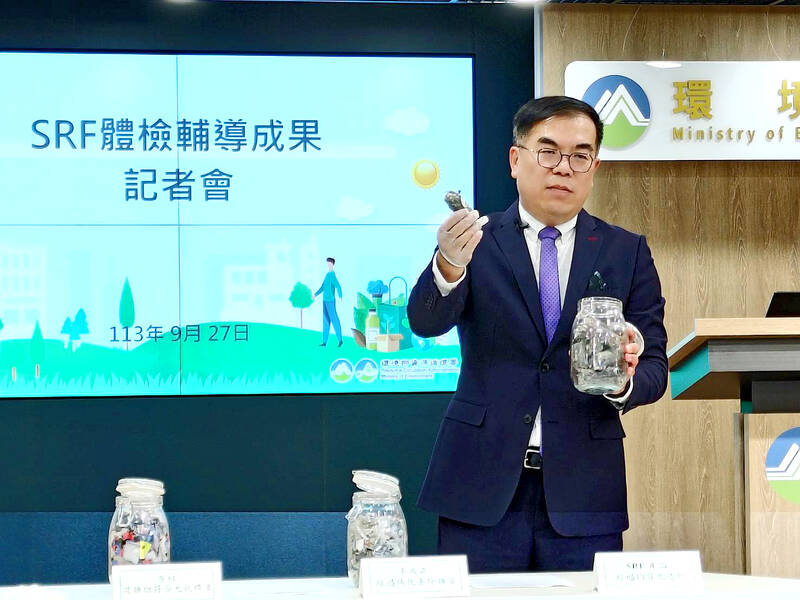Taiwan has tightened air quality regulations governing the production and use of alternative fuels to align with international standards, the Ministry of Environment said in a statement yesterday.
Stronger safeguards are needed for the nation to utilize solid recovered fuels, biofuels and waste-derived fuels to achieve net zero carbon emissions by 2050 without adding to air pollution, the ministry said.
The new rules provide a uniform set of fuel composition standards for fuel manufacturers, speicify appropriate fuel types for various applications and air pollution control mechanisms that must be used, it said.

Photo: Wu Po-hsuan, Taipei Times
Some manufacturers and end-users would be required to upgrade their equipment to retain their license, the ministry said.
The legal standards for heavy metal and dioxin emissions and combustion efficiency of boilers have been increased to conform with those established by the EU and other advanced nations, it said.
In addition, end-users must install sensors that have been linked to an appropriate regulator to continuously monitor dioxin standards and be held responsible for regular chimney inspections, the ministry said.
The revisions to the legal guidelines are intended to empower regulators end-to-end oversight of the industry’s supply chain with built-in redundancy of methods to ensure compliance, it said.
Separately, the Taiwan Science Media Center on Thursday called on the ministry to clarify its carbon emission reduction target over the coming years and raise carbon prices to a standard comparable to the best international practice.
Most Taiwanese experts agree that the government’s 2030 target to cut emissions by 26 to 30 percent compared with 2005 was too vague, said Hsu Hsin-wei (徐昕煒), associate professor of industrial engineering and management at National Taipei University of Technology.
Establishing a goal with excessive margins for error introduces uncertainty that a definitive target would not, he said, citing the center’s survey.
Taiwanese experts additionally agree that the carbon prices stipulated by the current system are too cheap to support even the ministry’s relatively unambitious 2030 goal, Hsu said, adding that the global target is slashing emissions by 42 percent.
The same poll suggests the nation’s architects believe their profession should promote designs that regulate heat without using air-conditioning, materials that require less carbon emissions to manufacture, and boast longer service life to avoid wastage, said Tsay Yaw-shyan (蔡耀賢), professor of architecture at National Chung Kung University (NCKU).
Cheng Tsu-jui (鄭祖睿), an assistant professor in NCKU’s Department of Transportation and Communication Management Science, said improvements in public transportation utilization rates are not catching up with the ever-increasing use of cars and motorbikes.
The government should begin considering measures that directly regulate the use of privately owned vehicles, including cars and trucks being utilized for commercial logistics, he said.

Chinese Nationalist Party (KMT) Chairman Eric Chu (朱立倫), spokeswoman Yang Chih-yu (楊智伃) and Legislator Hsieh Lung-chieh (謝龍介) would be summoned by police for questioning for leading an illegal assembly on Thursday evening last week, Minister of the Interior Liu Shyh-fang (劉世芳) said today. The three KMT officials led an assembly outside the Taipei City Prosecutors’ Office, a restricted area where public assembly is not allowed, protesting the questioning of several KMT staff and searches of KMT headquarters and offices in a recall petition forgery case. Chu, Yang and Hsieh are all suspected of contravening the Assembly and Parade Act (集會遊行法) by holding

PRAISE: Japanese visitor Takashi Kubota said the Taiwanese temple architecture images showcased in the AI Art Gallery were the most impressive displays he saw Taiwan does not have an official pavilion at the World Expo in Osaka, Japan, because of its diplomatic predicament, but the government-backed Tech World pavilion is drawing interest with its unique recreations of works by Taiwanese artists. The pavilion features an artificial intelligence (AI)-based art gallery showcasing works of famous Taiwanese artists from the Japanese colonial period using innovative technologies. Among its main simulated displays are Eastern gouache paintings by Chen Chin (陳進), Lin Yu-shan (林玉山) and Kuo Hsueh-hu (郭雪湖), who were the three young Taiwanese painters selected for the East Asian Painting exhibition in 1927. Gouache is a water-based

Taiwan would welcome the return of Honduras as a diplomatic ally if its next president decides to make such a move, Minister of Foreign Affairs Lin Chia-lung (林佳龍) said yesterday. “Of course, we would welcome Honduras if they want to restore diplomatic ties with Taiwan after their elections,” Lin said at a meeting of the legislature’s Foreign Affairs and National Defense Committee, when asked to comment on statements made by two of the three Honduran presidential candidates during the presidential campaign in the Central American country. Taiwan is paying close attention to the region as a whole in the wake of a

OFF-TARGET: More than 30,000 participants were expected to take part in the Games next month, but only 6,550 foreign and 19,400 Taiwanese athletes have registered Taipei city councilors yesterday blasted the organizers of next month’s World Masters Games over sudden timetable and venue changes, which they said have caused thousands of participants to back out of the international sporting event, among other organizational issues. They also cited visa delays and political interference by China as reasons many foreign athletes are requesting refunds for the event, to be held from May 17 to 30. Jointly organized by the Taipei and New Taipei City governments, the games have been rocked by numerous controversies since preparations began in 2020. Taipei City Councilor Lin Yen-feng (林延鳳) said yesterday that new measures by